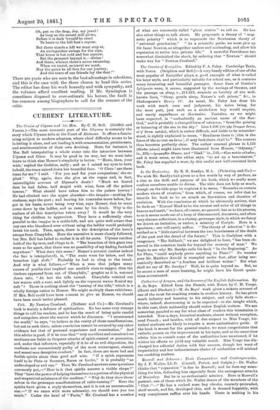The Orestes of Euripides. Edited by F. A. Paley. Cambridge
Texts, with Notes. (Heighten and Bell.)—A very handy edition of one of the most popular of Euripides' plays, a good example of what is called his later style, and particularly suitable for school use, as it contains many interesting and beautiful passages. Some lines of Goethe's Iphigenia were, it seems, suggested by the ravings of Orestes, and the passage on sleep, v., 211-215, reminds us forcibly of the well- known lines, "Sleep, gentle sleep, Nature's soft prison," &e., in Shakespeare's Henry IV. As usual, Mr. Paley has done his work with much care and judgment, his notes being, for the most part, just such as a sixth-form boy would require, and rarely superfluous or discursive. Tantalus, as we might have expected, is "undoubtedly an ancient name of the Sun- God," and is probably a changed form of vdxavros, "from the poising or balancing of the sun in the sky." Line 1,106 (vb Tap gT04/01, &To', ei gerrat KaAas), which is rather difficult, and liable to be misunder- stood, is rightly explained to mean, "Readiness there is [this is the force of the accent on la-riv], if only luck there shall be." The context thus becomes perfectly clear. The rather unusual phrase in 1,121 (04-0ai 74ous) might have been illustrated from Homer, "Odyssey," ix., 235,—Oputta7nv'‘Onuer, and "Iliad." ix., 513,-8ise roAilv KiActaor, and it must mean, as the editor says, "to set up a lamentation." Mr. Paley has supplied a want, by this useful and well-executed little book.






























 Previous page
Previous page